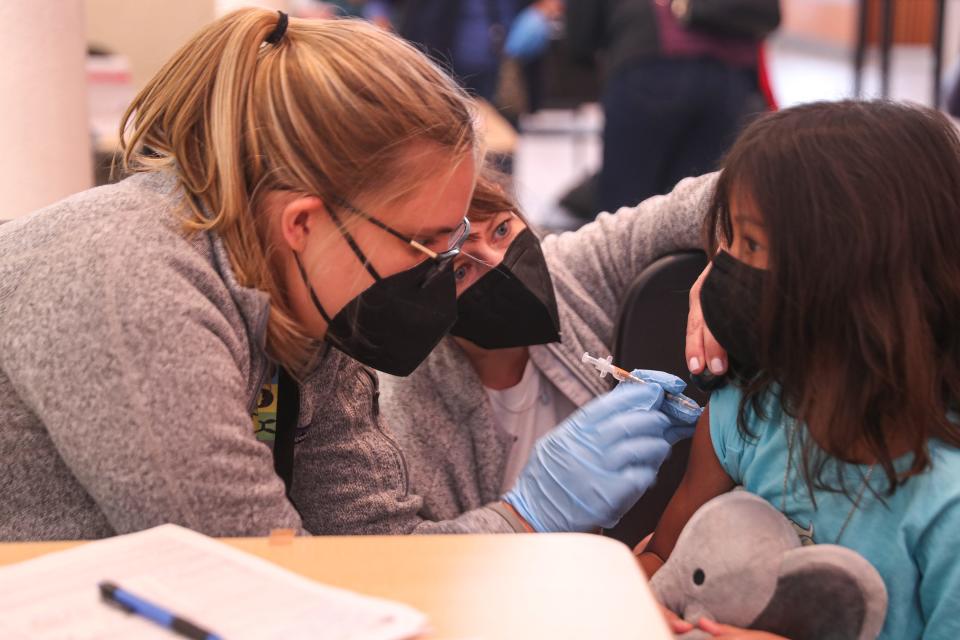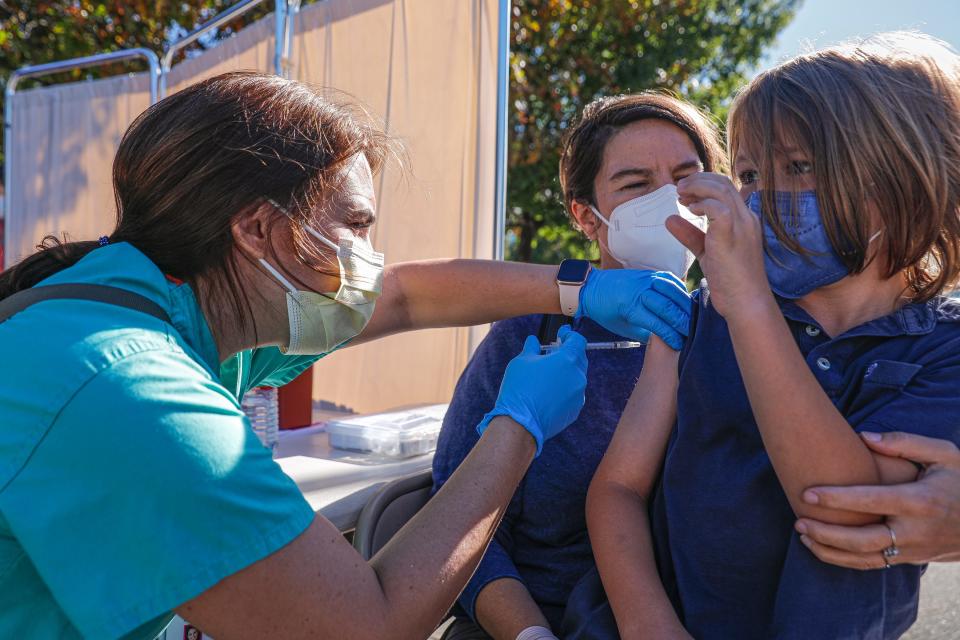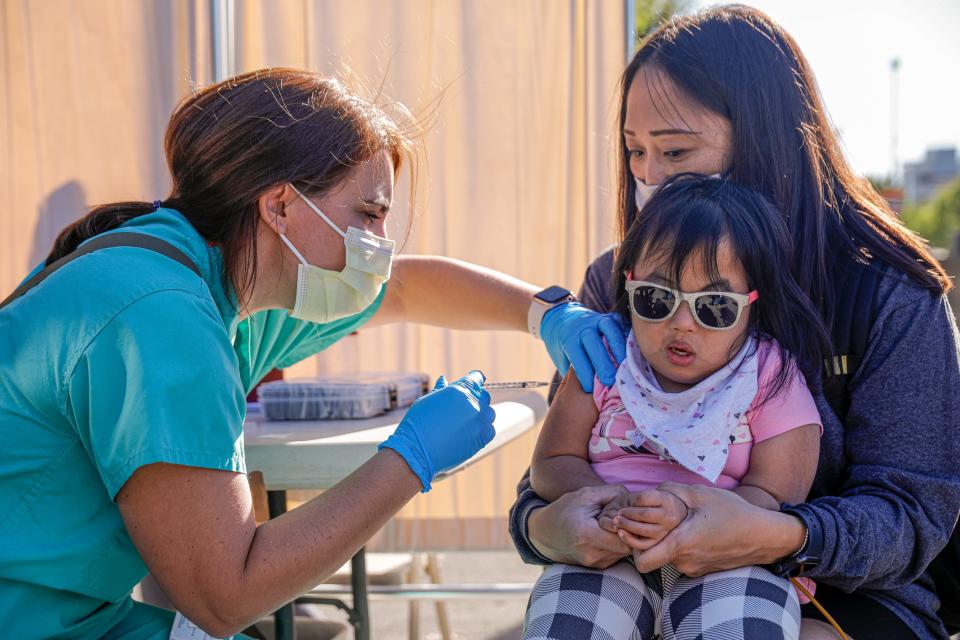Should your child get the COVID-19 booster? Central Texas experts weigh in
The U.S. Food and Drug Administration this week approved a change to its emergency use authorization for Pfizer's COVID-19 vaccine, which means children ages 5 to 11 can now receive booster shots five months after finishing their initial series of vaccinations.
The federal Centers for Disease Control and Prevention's Advisory Committee on Immunization Practices met on Thursday and recommended the boosters. CDC Director Rochelle Walensky signed off on the plan, making boosters available for kids in that age group.
We asked three Central Texas medical experts to answer our questions about this next round of boosters: pediatrician Dr. Marjan Linnell of Austin Regional Clinic in Kyle; Dr. Stanley Spinner, vice president and chief medical officer at Texas Children's Pediatrics and Texas Children's Urgent Care; and Dr. Donald Murphey, a pediatric infectious disease specialist at Dell Children's Medical Center of Central Texas.
COVID-19 and kids: 'Hitting kids hard': What to know about children and the omicron COVID-19 variant

Isn't COVID-19 over yet?
"COVID, it's not just a single wave," Murphey said. "There's not long-lasting immunity, and the virus is changing. It really is an especially difficult virus. There's more to come."
While cases have waned since the delta variant last summer and the omicron last winter, cases are rising again, Spinner said. "We're gearing up for an interesting summer," he said.
Austin is still considered in the low-risk category for community spread, according to the CDC's parameters, but on Tuesday, the seven-day moving average at local hospitals showed 33 people hospitalized with COVID-19, six in intensive care units and one on a ventilator.
The number of cases Austin Public Health has recorded has steadily risen since mid-April from 49.8 per 100,000 to 118 per 100,000. During the height of the omicron surge, the local transmission rate was regularly at more than 1,000 cases per 100,000.
Do kids need boosters?
The FDA looked at data from other countries as well as Pfizer's study on children with booster shots and saw that antibodies do start to wane.
The 5- to 11-year-olds were able to get their first vaccinations in November. For those kids, it's now been more than five months.
Adults 18 and older have been approved for a booster since last fall. Teens 12-17 were approved in January. Adults 50 and older were approved for a second booster in March.
COVID-19 is looking for somewhere to go with each mutation, medical experts say. It's looking for unvaccinated or even unboosted people.
Are there any kids who should not get vaccinated or a booster?
Consult your doctor, but typically the primary reason to not recommend the vaccine is if a child is allergic to the vaccine's ingredients.
Do kids get sick with COVID-19?
Yes. More than 14,000 kids have been hospitalized with COVID-19 and more than 1,000 have died, according to the American Academy of Pediatrics.
In kids, it's not just the initial infection. Kids can get lingering symptoms called long COVID, too. Kids also can get multisystem inflammatory syndrome a couple of weeks after their initial COVID-19 infection. Their initial COVID-19 infection can even be mild, but later they have severe myocarditis in the heart and inflammation in other organs.
Kids especially at risk have tended to be older and with comorbidities such as obesity and asthma, but that's not always the case.
When will booster shots be available?
three doctors and Austin Public Health said their organizations are ready to roll them out immediately. The first boosters could be in children's arms on Friday.
If my child has had COVID-19, do they need a booster?
The immunity from the natural infection is not as strong as the immunity that comes with the vaccine. Even if your child has had the primary series of vaccinations plus had COVID-19, a booster is recommended to prevent serious illness, hospitalization or death from a new COVID-19 infection.
People also are getting COVID-19 more than once.
For anyone who has had COVID-19, they should wait at least 10 days after the symptoms have gone before getting a dose of the vaccine.

If I get vaccinated and even boosted and still get COVID-19, does that mean vaccines don't work?
"Did they end up in the hospital or did they die?" Murphey said. "It happens with the flu vaccine. It may not prevent you from getting the flu, but it does prevent hospitalizations and death."
That's really the goal of the vaccines: preventing hospitalizations and death, while keeping our hospitals available to non-COVID-19 patients.
Kids and COVID-19 vaccines: What you need to know about children and COVID-19 vaccines
What about the side effects of the booster?
The booster shots in the older kids have not had the same level of incidents of myocarditis that was seen after the second vaccination. Even that occurrence was low, according to Pfizer's data, and local doctors saw only a few cases of vaccine-related myocarditis.
Kids who do have that reaction after vaccination tend to have a mild case that is treated with ibuprofen and goes away, Murphey said. The kids who get myocarditis after COVID-19, which is much more common, often need to be hospitalized for treatment, he said.
The other side effects from the vaccine or booster are typical shot reactions at the site, fatigue, headache, fever, soreness or body aches.
"The safety data is absolutely there for kids 5-11," Linnell said.
Vaccine boosters: Do I really need to get a COVID-19 booster? CDC real-world study confirms effectiveness
Is the booster the same as the vaccine?
Yes, for the Pfizer vaccine in kids ages 5-11, they receive 10 micrograms of the mRNA vaccine in the initial series as well as in the booster.
The only vaccine that is different in booster is the Moderna vaccine for adults, which is a half dose of the primary series.
For the Pfizer vaccine, the primary series is the first vaccination followed by a second vaccination at least 21 days later. Immune compromised people get a third dose, 28 days after the second dose. The first booster is five months after the completion of the primary series — two doses for most people, three doses for immune compromised people. For adults 50 and older, they can get a second booster four months after the first.
Can the booster be given with other vaccines?
Yes. It's a great time to make sure kids are caught up on their vaccinations before next school year.
Boosters facts: What do FDA's changes in COVID-19 boosters mean for you?

If we haven't started the vaccinations, is it too late?
Not at all. "We should all be getting vaccinated," Murphey said. "Anyone who can get a booster should get a booster."
This virus has brought so much heartache for families that their doctors have had to witness.
"As a parent, the last thing you want is for a kid to be in the hospital or worse, for something they could be vaccinated against," Spinner said. "The amount of guilt they have involved, it can be overwhelming to see their kid hooked up to ventilator with tubes coming out of them. They are too precious of a commodity being your child to take that risk."
Seniors and COVID-19: Do I need a second COVID-19 booster shot? Here's how to know
When will kids 4 and younger get their vaccine?
It's coming soon. The FDA is expected to meet about both the Moderna and the Pfizer vaccines for younger children in June.
If approved by both the FDA and the CDC, those vaccines will cover everyone 6 months and older. Newborns can get some immunity from their mothers being vaccinated while pregnant.
Linnell, whose own children are 8 and 4, said she can't wait for this next round of vaccines. When the kids ages 5 to 11 got their vaccinations in November, it felt like the best Christmas gift, she said.
Once her 4-year-old is vaccinated, she said, "I'll feel confident her risk of severe complications or death or hospitalizations are going to be low."
This article originally appeared on Austin American-Statesman: Does your child need a COVID booster? Central Texas experts weigh in

